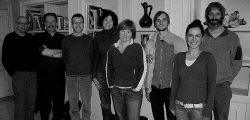Experts gather at Koffler to discuss Species at Risk Act
By Bill Rea
 | | The
members of the Canadian Institute for Ecology and evolution taking pat
in last week's conference at the Koffler Scientific Reserve were Murray
Rudd of Memorial University; David Green of McGill University: Arne
Mooers of Simon Fraser University: Lisa Manne of the University of
Toronto: Jeannette Whitton of the University of British Columbia: Chris
Grouisos, a graduate students of the University of Toronto; Azadeh
Rashvand, a graduate student from University of Toronto; and Daniel
Doak of the University of Wyoming. |
|
If changes are needed to the Species at Risk Act (SARA), the place where they've been identified might be in King.
The newly-formed Canadian Institute for Ecology and Evolution (CIEE)
held a three-day session last week at the Koffler Scientific Reserve at
Jokers Hill on Dufferin Street.
Arne Mooers, associate professor of biodiversity at Simon Fraser
University, one of the participants in the session, explained there
were nine experts taking part from all over the country.
Canada was one of the first major industrialized countries to ratify
the United Nations Convention on Biodiversity 15 years ago, but many
species, including caribou, grizzly bears, Atlantic Cod, spotted owls
and beluga whales, lack legal protection, in spite of being identified
as being at risk.
Mooers explained SARA was enacted five years ago, and is slated to be reviewed by Parliament next year.
"It's sort of a sciencefocused law," he said, adding it made sense for
CIEE to go through it, checking what has and hasn't worked.
He added it was a mixed group taking part; "people who have been deeply
involved with the legislation since day one, and people who are fresh."
Although Canada was quick to ratify the Rio Convention, it took several
years to get legislation passed. The United States was much faster
getting something in place. While Canada had to play catchup, Mooers
said the delay offered the advantage of observing what the Americans
had already done. "We were able to learn from their mistakes," he said.
He also said last week's session had been productive, adding they had
identified areas coming out of the legislation that were "depressing,"
especially in terms of how it was being implemented. He added they had
found issues of transparency, dealing with who makes decisions in the
end.
Koffler Director Art Weis was pleased the local facility got to host the gathering.
"This is sort of a proof of concept gathering," he said, "how to demonstrate there's a need in Canada that we can fulfill."
He added it offered a chance to bring top-noted scientists together to
take basic research findings and and seek ways to apply them to
canada's environmental health and well-being.